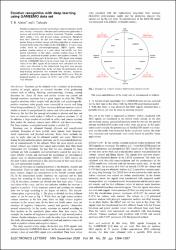| dc.contributor.author | Alakuş, Talha Burak | |
| dc.contributor.author | Türkoğlu, İbrahim | |
| dc.date.accessioned | 2021-12-12T17:01:31Z | |
| dc.date.available | 2021-12-12T17:01:31Z | |
| dc.date.issued | 2020 | |
| dc.identifier.issn | 0013-5194 | |
| dc.identifier.issn | 1350-911X | |
| dc.identifier.uri | https://doi.org/10.1049/el.2020.2460 | |
| dc.identifier.uri | https://hdl.handle.net/20.500.11857/3215 | |
| dc.description.abstract | Emotion recognition is actively used in brain-computer interface, health care, security, e-commerce, education and entertainment applications to increase and control human-machine interaction. Therefore, emotions affect people's lives and decision-making mechanisms throughout their lives. However, the fact that emotions vary from person to person, being an abstract concept and being dependent on internal and external factors makes the studies in this field difficult. In recent years, studies based on electroencephalography (EEG) signals, which perform emotion analysis in a more robust and reliable way, have gained momentum. In this article, emotion analysis based on EEG signals was performed to predict positive and negative emotions. The study consists of four parts. In the first part, EEG signals were obtained from the GAMEEMO data set. In the second stage, the spectral entropy values of the EEG signals of all channels were calculated and these values were classified by the bidirectional long-short term memory architecture in the third stage. In the last stage, the performance of the deep-learning architecture was evaluated with accuracy, sensitivity, specificity and receiver operating characteristic (ROC) curve. With the proposed method, an accuracy of 76.91% and a ROC value of 90% were obtained. | en_US |
| dc.language.iso | eng | en_US |
| dc.publisher | Wiley | en_US |
| dc.relation.ispartof | Electronics Letters | en_US |
| dc.identifier.doi | 10.1049/el.2020.2460 | |
| dc.rights | info:eu-repo/semantics/openAccess | en_US |
| dc.subject | learning (artificial intelligence) | en_US |
| dc.subject | human computer interaction | en_US |
| dc.subject | emotion recognition | en_US |
| dc.subject | electroencephalography | en_US |
| dc.subject | decision making | en_US |
| dc.subject | medical signal processing | en_US |
| dc.subject | entropy | en_US |
| dc.subject | emotion recognition | en_US |
| dc.subject | brain-computer interface | en_US |
| dc.subject | health care | en_US |
| dc.subject | education | en_US |
| dc.subject | entertainment applications | en_US |
| dc.subject | human-machine interaction | en_US |
| dc.subject | abstract concept | en_US |
| dc.subject | internal factors | en_US |
| dc.subject | electroencephalography signals | en_US |
| dc.subject | emotion analysis | en_US |
| dc.subject | EEG signals | en_US |
| dc.subject | positive emotions | en_US |
| dc.subject | negative emotions | en_US |
| dc.subject | GAMEEMO data set | en_US |
| dc.subject | deep learning | en_US |
| dc.title | Emotion recognition with deep learning using GAMEEMO data set | en_US |
| dc.type | article | |
| dc.authorid | TURKOGLU, Ibrahim/0000-0003-4938-4167 | |
| dc.authorid | ALAKUS, Talha Burak/0000-0003-3136-3341 | |
| dc.department | Fakülteler, Mühendislik Fakültesi, Yazılım Mühendisliği Bölümü | |
| dc.identifier.volume | 56 | en_US |
| dc.identifier.issue | 25 | en_US |
| dc.relation.publicationcategory | Makale - Uluslararası Hakemli Dergi - Kurum Öğretim Elemanı | en_US |
| dc.authorscopusid | 57200138797 | |
| dc.authorscopusid | 6603155686 | |
| dc.identifier.wos | WOS:000604957700004 | en_US |
| dc.identifier.scopus | 2-s2.0-85098915326 | en_US |
| dc.authorwosid | ALAKUS, Talha Burak/ABI-1288-2020 | |
| dc.authorwosid | TURKOGLU, Ibrahim/A-2640-2016 | |
| dc.authorwosid | ALAKUS, Talha Burak/W-4832-2018 | |



















